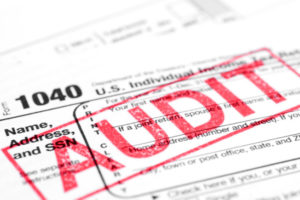 There are few things taxpayers fear more than an audit letter from the Internal Revenue Service. Despite the worry an audit can cause, the number of audits has actually been on the decline. In fact, according to the IRS, only .7% of all individual tax returns were audited in 2016. While the chances of being audited may have dropped over the last few years due to budget cuts and reductions in personnel, there are certain red flags that could greatly enhance your chances being audited. Carefully review the situations below to determine if you could end up attracting extra attention and scrutiny from the IRS this tax year.
There are few things taxpayers fear more than an audit letter from the Internal Revenue Service. Despite the worry an audit can cause, the number of audits has actually been on the decline. In fact, according to the IRS, only .7% of all individual tax returns were audited in 2016. While the chances of being audited may have dropped over the last few years due to budget cuts and reductions in personnel, there are certain red flags that could greatly enhance your chances being audited. Carefully review the situations below to determine if you could end up attracting extra attention and scrutiny from the IRS this tax year.
Above average income
As you might imagine, with lower budgets and limited resources, the IRS must be strategic with who they target for an audit. After all, the stakes are higher and the IRS stands to collect more as taxpayer income increases. While earning money is not necessarily a bad thing, your chances of receiving an audit letter increase exponentially as income goes up. For example, in 2016, those earning $200,000 or more had a 1.7 percent chance of being audited – roughly 1 in 59 taxpayers. Your chance of being audited jumps to over 5.8 percent (1 in 17 taxpayers) if you earned $1 million or more. The probability of an audit for taxpayers with income less than $200,000 declined to .65 percent or 1 in 154. Remember, higher earnings can equal higher levels of IRS scrutiny.
Failing to report income
Since the IRS is essentially carbon copied on all income reported from outside sources (employer W2s, financial institution 1099s, retirement plans, etc.), failing to correctly report any items is a surefire way to draw attention to your return. Be sure to carefully review your return for any inconsistencies and be sure to report all income sources accurately. Consider double checking the accuracy of all income sources on your return as it may help limit IRS issues.
Careless mistakes
Like failing to properly report income, careless mistakes are another easily avoidable, yet common audit red flag. Incorrect social security numbers, mathematical mistakes, typos, and other careless errors can all lead to further reviews of your return. Be sure to carefully check and then double-check your return to prevent these often-overlooked errors that could draw unnecessary attention from the IRS.
High deductions
While the Tax Cuts and Jobs Act will change deductibility this year, taxpayers still have access to the full breadth of deductions for tax year 2017. With that said, the IRS generally compares your tax data to information from similar taxpayers at your income level, ultimately identifying any meaningful differences. For example, claiming disproportionately high deductions as compared to your peers is a good way to get a second look by the IRS. From home office deductions to rental property losses, be careful when claiming large deductions. While you shouldn’t let fear of IRS scrutiny cause you to avoid deducting everything that you are entitled to, be careful to maintain detailed records and be prepared to substantiate any excessively high deductions.
Owning a cash business
If you own a cash-intensive business, your chances of being an audit target may be higher. From car washes and hair salons to restaurants and laundromats, cash businesses are often targeted by the IRS. Why are these businesses getting more attention from agents? The IRS is well aware that the use of cash can lead to inaccuracies in the reporting of income and expenses. Understating income and overstating expenses are both good ways to draw attention to your return. Not only does this apply to cash businesses, but workers who receive a large portion of their income from tips should also take extra care to correctly report their information.
Personal expenses masquerading as business expenses
Pushing the envelope by trying to deduct personal expenses as business expenses is yet another common audit red flag. Automobiles used for personal use, meals, travel and entertainment are all areas the IRS will be keeping a closer eye on. Why? The IRS understands that it is common for taxpayers to attempt to categorize personal expenses as legitimate business expenses. Be especially careful with the criteria for deducting an automobile for business use. Consider reviewing “Publication 463 — Travel, Entertainment, Gift and Car Expenses,” to ensure that you are properly deducting these expenses.
As noted above, taxpayers should not be afraid to claim any legitimate deductions they are entitled to. Instead, just be sure to carefully substantiate your deductions and avoid pushing the envelope when it comes to taxes. After all, taxpayers have more to loose than they have to gain by doing so.
In the event you are targeted for an audit, review IRS Publication 556 - Examination of Returns, Appeal Rights and Claims for Refund for additional information on audit procedures. Since everyone’s tax situation is unique, consider speaking to your accountant to determine the appropriate approach for you.
Kurt J. Rossi, MBA, CFP®, CRPC®, AIF® is a CERTIFIED FINANCIAL PLANNERtm Practitioner & Wealth Advisor. He can be reached for questions at 732-280-7550, kurt.rossi@Independentwm.com, www.bringyourfinancestolife.com & www.Independentwm.com. LPL Financial Member FINRA/SIPC.









